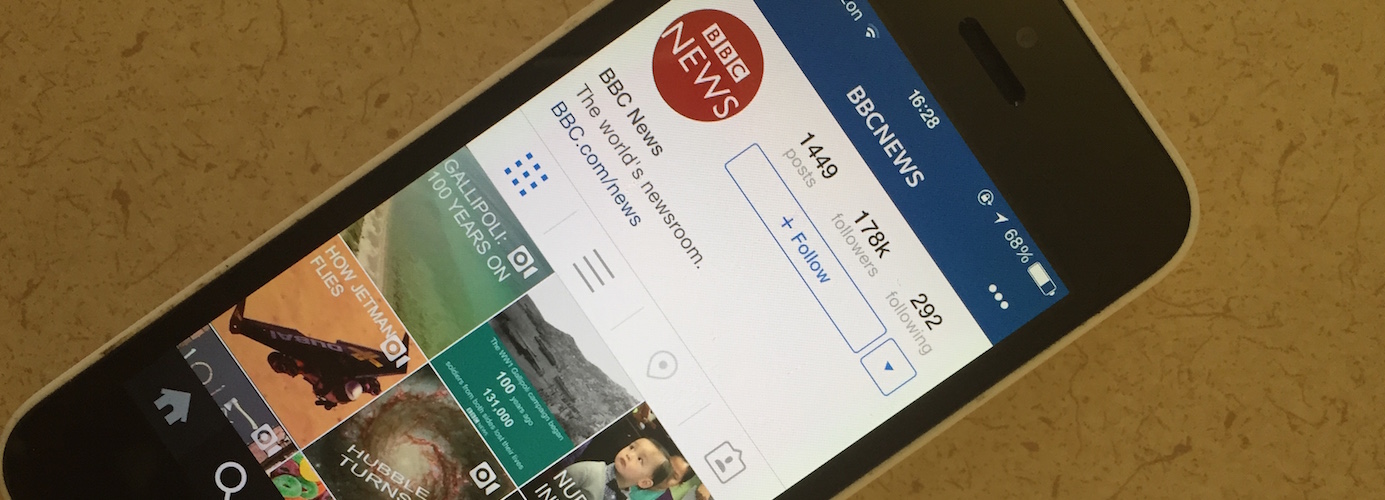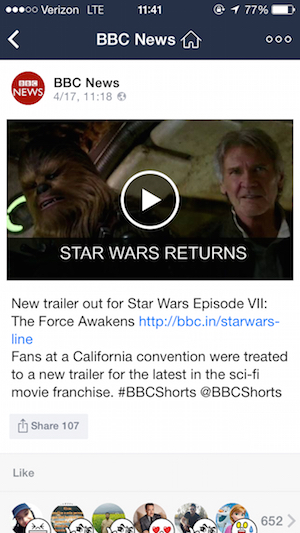
The video, posted to the BBC Azeri service’s Instagram account last month, showed explosions, soldiers standing in formation, and aircraft flying into battle. It was footage that people all around the world had been clamoring to see: the trailer for Ulduz müharibələri.
The same video was posted to the BBC Arabic account under the title “حرب النجوم.” On the BBC Mundo Instagram page it was called Guerrade las Galaxias. And on the main BBC News Instagram account, the video was for the new Star Wars movie; each video ended with Harrison Ford’s Han Solo saying, “Chewie, we’re home.”
In all, the Star Wars video was posted to BBC Instagram accounts in five different languages. The video is consistent across accounts except for subtitles, which were tuned to each specific language.
The videos were made by BBC Shorts, a group within BBC News that produces square-shaped videos — perfect for Instagram — that can easily be shared by the BBC’s different language services on social networks.
It’s part of a larger effort by the BBC to find ways to distribute web and social content across the broadcaster’s 28 different language services. Hernando Alvarez, the editor of BBC Mundo, is leading a team to build a global content hub to streamline these processes; a three-month test run was completed at the end of March.
“What we were trying to test were two main concepts,” Alvarez told me. “One was more in terms of whether this could streamline the production process and produce some savings. The second was if this centralization of social- and mobile-first production could help the language services achieve some of their strategic objectives around audience engagement and relevance.”
BBC Shorts started in early 2014 and grew out of the BBC’s Video Innovation Lab. Andrew Webb, editor-in-chief of BBC Shorts, joined the project last April and was the sole person working on it for about nine months before it became part of the larger content hub. Depending on the day, he said, there are now up to four producers working on BBC Shorts, editing and creating videos for both global and British audiences.
Webb developed the template for the videos, so any language service can pull the original English version of a BBC Shorts video from the internal network and translate the captions into the appropriate language. The BBC also built a template that helps automate the translation process because in certain languages, such as Chinese, the characters wouldn’t work properly in the original format, so editors can format the subtitles as PNG files and then add them to the video.
There are two English-language BBC accounts and eight different language services on Instagram, Webb said. Though the videos produced by BBC Shorts are also used on Facebook, YouTube, the BBC’s own website, and even occasionally on BBC TV programs.
 But the place where BBC Shorts is growing the quickest is the messaging app Line, Webb said. The BBC launched its account on the service last October, and within three days it grew from a following of 11 internal accounts to 120,000 followers, Webb said. The account now has nearly 800,000 followers, Webb said, having taken off in India and other parts of Asia in particular.
But the place where BBC Shorts is growing the quickest is the messaging app Line, Webb said. The BBC launched its account on the service last October, and within three days it grew from a following of 11 internal accounts to 120,000 followers, Webb said. The account now has nearly 800,000 followers, Webb said, having taken off in India and other parts of Asia in particular.
“I have the power to make 800,000 people…receive effectively a text message with my video,” Webb said. “We thought it was really cool at the beginning, and then we noticed that there was a high rate of blocking because it’s actually quite annoying. So we pulled that back to one or two alerts a week.”
Regardless of where the videos are posted, BBC Shorts’ goal is to expand the BBC’s reach beyond its traditional broadcast and web audiences — especially in developing markets where smartphone use is exploding. In that regard, Webb said, it seems that BBC Shorts is succeeding.
“I’ve put stories out two or three days after they’ve been on the BBC website to see if people would go, ‘Why are you running this three days after I saw it?’ And, of course, nobody noticed,” he said. “It really showed that we were getting to a market that wasn’t looking at the BBC News website.”And as the global content hub scales up, BBC News plans to increase the amount of mobile and social content it produces while also expanding to additional platforms and repurposing material from other parts of the BBC.
Since the global content hub trial ended in March, BBC News has been building a team to run it, and the aim is to launch “as soon as possible,” with the idea that it’ll be up and running this summer, Alvarez said. At the start, there will be three editors and six or seven producers working in London on the content hub, with other staffers in either Delhi or Washington so they can provide coverage around the clock.And as the growth continues, they’ll look to see if there are more ways to utilize BBC content, even the not quite highbrow. BBC Shorts, for example, posted a blooper from a standup shot of a reporter in India where a cow urinated in the background.
“This is taking material from everywhere in the BBC,” Alvarez said.
Webb said the group is also interested in producing videos longer than the 15-second limit on Instagram — specifically they’re considering 31-second videos on YouTube. (Why? That’s the minimum length required to run ads on the site. Any ads on these videos would only be targeted at users outside of the United Kingdom, since the BBC can’t legally target ads at British users.)
As the group grows, they’ll look to continue to streamline processes within the BBC network to make it easier to produce more videos, and they’ll also look to produce content for specific platforms such as Snapchat to continue to try and reach new audiences.
“When we talk about mobile and social,” Alvarez said, “We want to make audiences that normally may have a stereotype about what the BBC is — we want to show them that the BBC is up to speed with the modern times.”